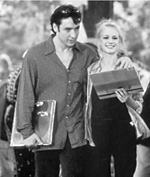LIKE MOST Budweiser-swilling youth living in California’s unenviable Central Valley, the members of Grandaddy are products of a broken environment. They learned early on that somewhere else is always better than Modesto and that someone in Modesto is always meaner than you are. But singer Jason Lytle’s splintered worldview is not filled with broken hearts or single-parent, split-level homes; rather, it’s a joyous kind of busted, a life where dead microwaves and abandoned PC keyboards find harmony with desert vermin. Grandaddy is where the heart is—even if the heart is in the middle of an alcoholic robot’s torso. And once this strange collision of organic and high tech is put to music, it’s obvious there’s a serious need for Grandaddy in anthropology classrooms. Nonrandom mating and Paleolithic culture never seemed like comedic material until 1997’s remarkable Under the Western Freeway came along.
Grandaddy
Crocodile, Wednesday, March 22
“The desert tends to cook people’s brains,” Lytle theorizes in his soft morning voice. “Including mine. This area we live in is a commuter area for the Silicon Valley, and there’s a physical dividing line between the Central Valley and the techies. I tend to kinda let my imagination run wild with the thought of a new breed, of some way to fuse the whole old-school, agricultural mentality with this totally on-the-brink future technology; imagine the superhuman that could produce.” This obsession with evolution pops up over and over in Grandaddy’s absorbent shell of burbling keyboards, pine-fresh vocals, and fuzzed-out guitar. On the forthcoming record Sophtware Slump (out in May on V2), Lytle’s songwriting brings to life some of the most oddly soothing images in modern pop: Salamanders and owls make homes in forgotten kitchen appliances (“Broken Household Appliance National Forest”); a mountain lake mocks suburbans in their townhomes with fake fishing ponds (“The Crystal Lake”); and technology provides us not with answers, only helpless mutations (“Jed the Humanoid,” “Miner at the Dial-a-View”).
GRANDADDY BEGAN as a trio; Lytle, bassist Kevin Garcia, and drummer Aaron Burtch met in a local skate shop. Modesto’s rough-and-tumble bars proved challenging for Grandaddy’s mellow keyboard pop, and even the band’s skater friends gave them shit about it. “I’ve always been a glutton for punishment in that I like to resist what’s popular,” Lytle says. “Here I was making a wholehearted attempt to slow things down and make the music pretty, and the skateboard crowd—our friends—expect this hard, high-NRG music. People hated us.” Including the Valley’s infamous good ol’ boys. When the band added Tim Dryden on keys and Jim Fairchild on guitar, the group’s songs started taking on a new spin, what Lytle terms “fluffy and melodic.” He says the crowds thought Grandaddy were a bunch of new wave fruits, noting the inevitable jock catcall, “Hey, y’all sound like the Cure!”
Then the British press took a fancy to Under the Western Freeway as well as to Grandaddy’s collective beards (Lytle and several other members cultivate awe-inspiring hunter hair). NME and Melody Maker led the way, and soon letters started pouring into Lytle’s Modesto mailbox. “It’s so strange, the British [music writers] seem to be so cynical about American bands, especially Californians. I dunno why they liked us. What I really liked was hearing from regular people, people not connected to the music business, who said they were affected by our music. That’s the good part.”
Still, Freeway (originally on Seattle’s Will Records) remained semiobscure until V2 picked it up and rereleased it along with last year’s sparkling Signal to Snow Ratio EP. It provided the band with the boost it needed to record some fresh material. “When we finally got going with Under the Western Freeway, it was getting pretty old for us,” admits Lytle. By the time the record had a proper release, the band had been playing those songs for three years. He calls Sophtware Slump a step up for the five-piece: “It’s a bigger, enhanced version with all the same ideology of Grandaddy intact.”
Indeed, the new record is rife with imagery and more engulfing synth bits than even a Cars fan would know what to do with. Lytle’s fucked-up superhumans populate uninhabited pockets that haven’t been touched since ELO left the pop sphere. It almost makes one long for a quiet space in the desert, perhaps a lonely beer in an airplane graveyard or a sleeping bag filled with motorized ants. Almost. Save for Grandaddy, the desert is still a bad place. Back to his anthropological perspective, Lytle explains that people suffer when they inhabit places best left to nature. “I think nomadic people had it figured out a long time ago. You either acclimate to a certain area, or you learn to totally avoid certain areas during certain seasons and move on. Air-conditioning and TV have confused people’s nomadic sensibilities.” Jason, are you sure you don’t want a side job as a sociologist? “Gawd, if people didn’t depress me so much, I might consider it,” he answers.







